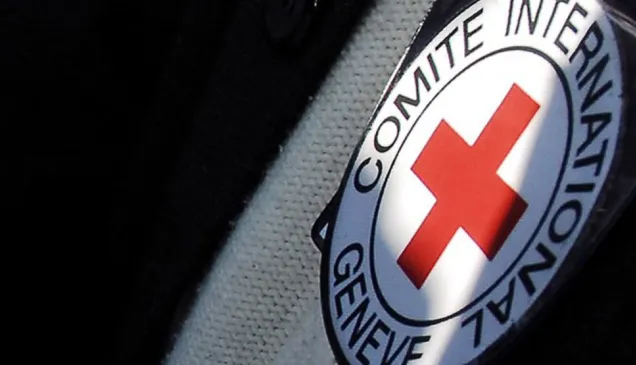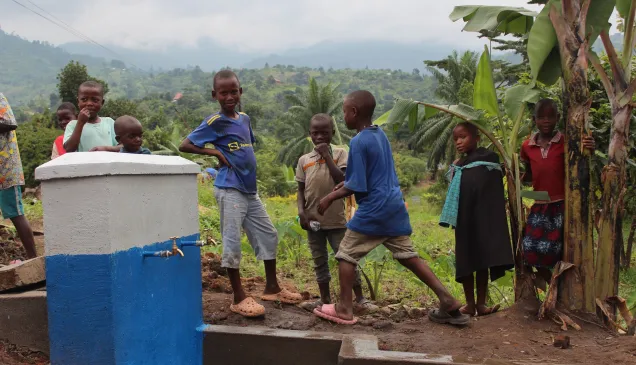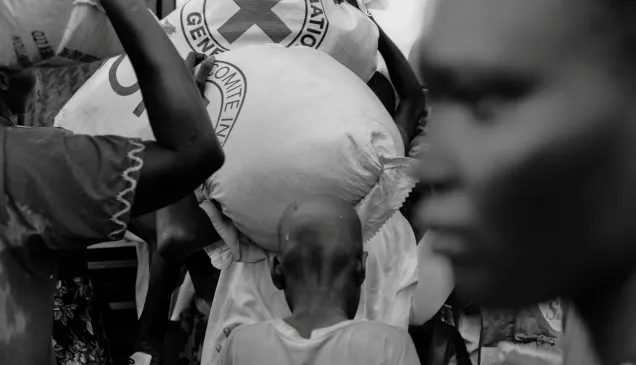ICRC and ICC: Two separate but complementary approaches to ensuring respect for international humanitarian law
As the guardian of international humanitarian law (IHL), the ICRC supports efforts to end impunity for international crimes and is keenly interested in the establishment and jurisprudence of international criminal tribunals. However, ICRC staff do not testify before such tribunals.
Anne-Marie La Rosa, legal adviser and focal point for the ICRC on issues related to international criminal justice, discusses the relationship between the ICRC and the International Criminal Court (ICC) and the separate but complementary roles the two organizations play in ensuring respect for IHL.
Does the ICRC participate in the work of international criminal tribunals?
The ICRC has a clear and long-established practice of not becoming involved in judicial proceedings and of not disclosing what it discovers during its work. This practice is grounded in extensive experience in the field and in the organization's utmost respect for confidentiality. The ICRC does not hesitate to remind those involved in armed conflicts – be they governments or non-State armed groups – of their obligations under IHL. But as a neutral and independent organization, we strongly believe that we will only be able to do this by ensuring continuous and confidential dialogue with all parties to the conflict. Confidentiality does not mean silence or acquiescence. It means that we only share our information and findings on alleged violations of IHL with the party responsible. The information we collect is not and will not be shared with anyone else, including the ICC.
Why does the ICRC not get involved in the activities of the ICC?
The work of the ICC and that of the ICRC constitute alternative approaches to preventing IHL violations, approaches we see as complementary. While the ultimate objectives are similar, the tools are quite different. The ICC prosecutes and sanctions, whereas the ICRC promotes respect for IHL through confidential dialogue and persuasion.
The ICRC protects and assists people who are not (or are no longer) participating directly in an armed conflict or other situation of violence. Only if all parties to a conflict accept the ICRC will we have access to those in need. The ICRC’s usual approach to possible violations of IHL is to engage in critical, confidential dialogue with those who have the power to improve the situation. Our mission is exclusively humanitarian: to protect the lives and dignity of victims of armed conflicts and other situations of violence and to provide them with assistance. Taking part in an ICC investigation or proceedings could compromise our ability to carry out that mandate.
Did the ICRC support the establishment of the ICC?
The ICRC has always supported the creation of an international tribunal with jurisdiction over the most serious international crimes. For the ICRC, an international tribunal has the capacity to act as a catalyst and as an incentive for national courts to fulfil their obligation to prosecute those who commit war crimes. It therefore welcomed the establishment of the ICC in July 1998. The ICC operates on the “complementarity principle,” which means it will act only if domestic courts are unwilling or unable to do so. The ICRC was very active in the preparatory work leading to the Rome Statute (Statute of the ICC) and took part in drawing up the Elements of Crimes that the States Parties adopted in September 2000. These Elements of Crimes detail the definitions of genocide, crimes against humanity and war crimes that the ICC Statute contains.
The ICC Statute was clearly a major advance in the implementation of IHL and should help to ensure compliance with this branch of law. The ICRC participates in the annual conference of States Parties and is closely following the discussions regarding the 2010 conference on the review of the Statute.
What are the links between the ICC, its Statute and the ICRC?
In addition to having supported the establishment of the Court, the ICRC promotes the ratification and implementation of the ICC Statute through its Advisory Service. In practical terms, the ICRC uses the ICC Statute when assisting States in their efforts to adopt and implement effective domestic measures for the prosecution of war crimes. One very positive element of the ICC Statute is that it includes quite a comprehensive list of war crimes, covering both international and non-international armed conflicts. This is the first time that such a list has been enshrined in an international instrument.
It is also worth mentioning that since April 2006 the ICRC has been the organization authorized to visit all persons detained under the jurisdiction of the ICC. We have already carried out a number of visits to The Hague in this capacity.
Can ICRC staff be forced to testify before the ICC or other international criminal tribunals?
The ICRC enjoys immunity against giving testimony before criminal tribunals, so it cannot be compelled to testify. This was confirmed in 1999, in a decision by the International Criminal Tribunal for the former Yugoslavia (ICTY) in the Simic case. That decision was subsequently cited with approval by other international criminal tribunals, such as the International Criminal Tribunal for Rwanda and the Special Court for Sierra Leone. The ICC has gone further by recognizing expressly in its Rules of Procedure and Evidence (Rule 73) that information in the hands of the ICRC is not subject to disclosure, including by way of testimony.
Furthermore the vast majority of Headquarters Agreements that the ICRC has signed with States where we currently operate contain a provision granting such immunity to ICRC staff (expatriate and national, current and former) before the courts of the countries concerned.
Is it possible to promote IHL during a conflict?
Certainly. IHL is a set of rules that seeks to limit the effects of armed conflict on humanitarian grounds. It protects people who are not (or are no longer) participating directly in a conflict and it restricts the means and methods of warfare. The ICRC's mandate includes promoting IHL at all times and regularly reminding all parties to a conflict of their obligation to respect the rules of war.
In addition, we work continuously to spread knowledge of IHL, through our dissemination efforts worldwide. There are no limits to promoting IHL. The time is always opportune since it is civilians, especially women and children, who bear the brunt of armed conflicts.
Is it sufficient simply to remind parties to a conflict of their obligations?
No. We seek to integrate IHL into national legislation, so that national judiciaries have laws at their disposal under which they can prosecute violations of IHL and bring those who commit such violations before their own courts. We also work with the armed forces, helping them to include IHL in their training programmes, doctrines and operations in an effort to prevent or limit abuses in time of war. Every party to a conflict should be aware of their commitment to “respect and ensure respect for” IHL at all times, and they must be convinced that fulfilling this commitment is their responsibility.



